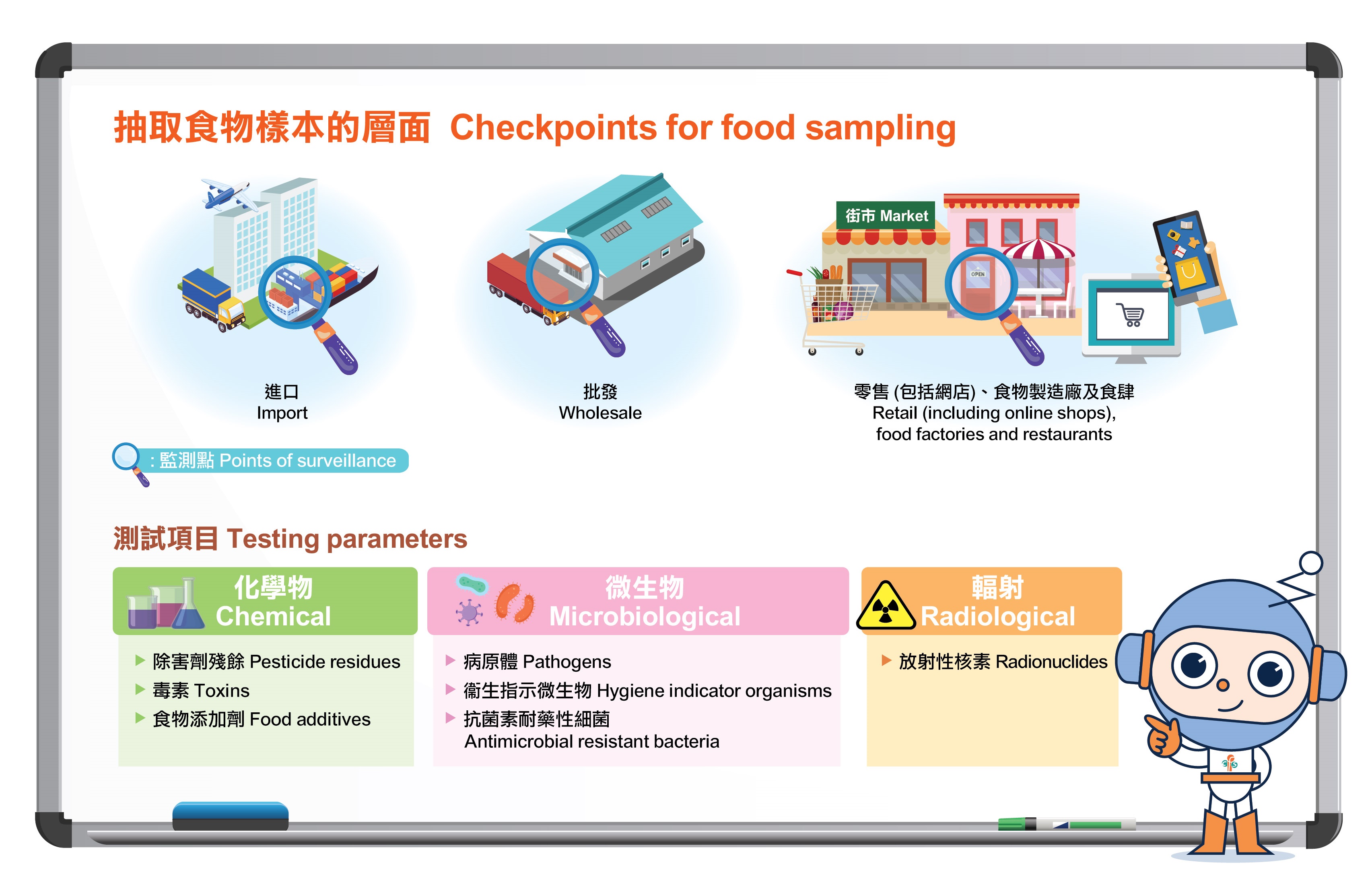
Food Safety Focus (214th Issue, May 2024) – Article 1
Guardians of the Plate: The Vital Role of Food Surveillance Programme
Reported by Dr Jerry MANG, Senior Medical Officer and
Mr Kenneth YUNG, Scientific Officer,
Risk Management Section, Centre for Food Safety
It is everyone's duty to maintain food safety. Both consumers and food businesses should include the Five Keys to Food Safety in their daily routines to prevent foodborne diseases. The Codex Alimentarius Commission (Codex) provides detailed principles and guidelines for food control systems. Codex recognises that an effective food control system is essential for ensuring the safety and suitability of food for consumers and ensuring fair practices. Additionally, food surveillance is a crucial component of an extensive food control system that enhances food safety and public health. This system includes upstream measures such as import protocols for high-risk foods, regulations and standards, and downstream activities like food surveillance, all working in collaboration.
As advocated by Codex, one key principle of an effective food control system is the adoption of a whole food chain approach to food surveillance, ensuring that monitoring occurs at various stages—from farm to table—to proactively detect and mitigate risks before products reach consumers. Additionally, these systems should be built on a foundation of scientific evidence and operate according to risk-based principles. Practices in food surveillance vary widely across different regions, reflecting each area's unique challenges, regulatory environments, adherence to international standards and levels of development.
Food Surveillance in Hong Kong
Food surveillance involves the continuous monitoring and assessment of the food supply chain to detect and address risks associated with food safety. This proactive approach helps in identifying potential hazards before they cause harm, ensuring that corrective actions can be implemented swiftly. Surveillance data are crucial for risk assessment and management, guiding policy decisions and prioritising regulatory focus.
In Hong Kong, the Food Surveillance Programme (FSP) conducts safety tests on about 65,000 food samples each year, which translates to about 9 samples per 1,000 people, a sampling rate that is relatively higher compared to other jurisdictions. To protect public health, it is essential to maintain vigilant oversight and take immediate risk management steps in response to any unfavorable outcomes from the FSP.
Main Features of the Centre for Food Safety (CFS) Food Surveillance Programme
Throughout the year, the CFS collects food samples at various levels including import, wholesale, and retail/catering. Dedicated food control offices at boundaries ensure timely collection of samples from foods imported via different routes. Additionally, samples are systematically gathered from wholesale markets, retail outlets, food factories and restaurants. With the rise in online shopping, a portion of retail samples are now also procured through online platforms, reflecting the changing consumer behaviour towards internet purchasing.
The CFS's FSP is structured to monitor a broad spectrum of foods and potential risks, incorporating seasonal variations. It includes routine, targeted, and seasonal surveillance projects. Routine surveillance covers key food groups like vegetables, fruits, meat, poultry, aquatic products, dairy products and eggs, ensuring compliance with food safety standards. Targeted surveillance addresses specific risks such as the illegal addition of sulphur dioxide in fresh meat or the presence of Cronobacter sakazakii in infant milk powder. Seasonal surveillance align with cultural festivals or seasonal consumption patterns, examining foods like rice dumplings during the Tuen Ng Festival or mooncake during Mid-Autumn Festival, ensuring food safety during peak consumption periods.
Risk-based Sampling and Test Selection
A risk-based approach is adopted for the selection of food samples and testing parameters, prioritising high-risk foods, previous unsatisfactory samples, reports of local or overseas food incidents, intelligence and public concerns. An internal review is conducted regularly to reflect new legislation and standards. The testing scope includes chemical, microbiological and radiological hazards, ranging from food additives and contaminants to pathogens and radiological parameters, as well as antimicrobial resistance bacteria (Figure).
Besides, the FSP is also reviewed by the Expert Committee on Food Safety before implementation. Additionally, a working group focuses on the unique challenges of foods purchased via online platforms, adapting surveillance methods to this modern buying trend. The outcomes of these surveillance activities and the progress of the working group are reported regularly to the Panel on Food Safety and Environmental Hygiene of the Legislative Council, facilitating transparency and continuous improvements in food safety practices.

Figure: The Food Surveillance Programme of the CFS monitors the safety of different types of food from multiple sources
How FSP Safeguards Food Safety
The FSP is an important component of the food safety framework, engaging in risk-based monitoring to ensure food safety and compliance with standards. It not only systematically collects and analyses a wide array of food samples for contaminants like pathogens, chemical residues and toxins, but also enforces regulatory compliance and prosecutes non-compliant entities. This enforcement is crucial for keeping pace with new regulations. Furthermore, the FSP supports risk management and communication strategies, ensuring the public is kept informed through clear reporting and rapid distribution of essential food safety information. This is achieved via press releases, social media and other platforms when samples do not meet safety standards. Other risk management measures, including source tracing, product recalls, informing the place of origin and temporarily halting imports, are also implemented. Food Safety Reports are released regularly to keep the public informed.
In summary, the CFS upholds food safety through rigorous surveillance, ensuring compliance, and acts promptly to address any issues related to unsatisfactory results. This proactive and comprehensive approach is vital for preventing foodborne diseases and protecting public health.







